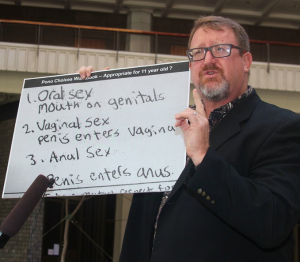Hawaii students get gift cards to participate in sex education program

Hi Rep. Bob McDermott holds up a copy of notes from an 11-year-old student enrolled in the sex education classes in the state’s public schools. Many parents complained the content is inappropriate and graphic for their children.
By Malia Zimmerman | Watchdog.org
HONOLULU – The University of Hawaii Center on Disability Studies gives gift cards to middle school students who participate in a controversial sex education program.
The gift cards, valued at between $10 and $20 each, are issued to 11, 12 and 13-year-olds who participate in Pono Choices. About $52,200 of a $5 million U.S. Office of Adolescent Health grant were used to buy the cards.
“The Pono Choices program provides gift cards to students, who have taken the course, as an incentive to complete student surveys. Student opinion is the most powerful measure in the effectiveness of the program and we support the efforts in seeking such feedback,” said Donalyn Dela Cruz, a spokeswoman for the Hawaii State Department of Education.
The curriculum, developed by the University of Hawaii Center on Disability Studies, set off a firestorm over the past year. Some parents and lawmakers said the program, which taught children as young as age 11 about anal and homosexual sex, was inaccurate and inappropriate.
Rep. Bob McDermott, R-Aiea, who has a 12-year-old son in public school, led the charge to pressure the state Board of Education to pull the curriculum. He accused the DOE of “normalizing homosexual lifestyles” and “putting students at risk by withholding critical facts.”
After pressure from McDermott and the public, the DOE pulled the curriculum and formed a task force to review concerns. The task force released 11 new recommendations on June 6 and stopped the implementation of the program until developers addressed the concerns and inaccuracies. The program was reinstated over the summer.
According to the U.S. Department of Health and Human Services website, the University of Hawaii receives annual funding of just under $1 million a year for five years for the Pono Choices program “to reduce the number of teen pregnancies and incidence of STIs; increase positive bonding in the school and community; increase sense of self-identity and self-efficacy; and improve expectations for the future.”
McDermott, who has highlighted the most controversial and medically inaccurate parts of the curriculum and called for the program to be shut down, said the gift cards are a waste of taxpayer money.
The gift cards render the data collected through Pono Choices meaningless, McDermott said, “because of an inherent bias caused by the financial inducement.”
“This is a shameless manipulation of the data – giving 11-year-old kids a $10 dollar gift card, and then asking them how they liked the program,” McDermott said. “Hawaii’s parents are in the unique situation of having their own tax dollars used to propagandize the ‘value’ of this deceptive intrusion into their public schools, to ‘sell’ them on a program they didn’t ask for and don’t want. Paying to be brainwashed so you will consent to pay more to have your children brainwashed is not a good use of tax dollars.”
McDermott said families were told Pono Choices was a “new curriculum” being tested or a “pilot project,” but were never told their students were participating in a research project.
“Their kids were being used as human subjects for research. This is a horrible breach of trust between the DOE and the owners of the system, the parents,” McDermott said.







